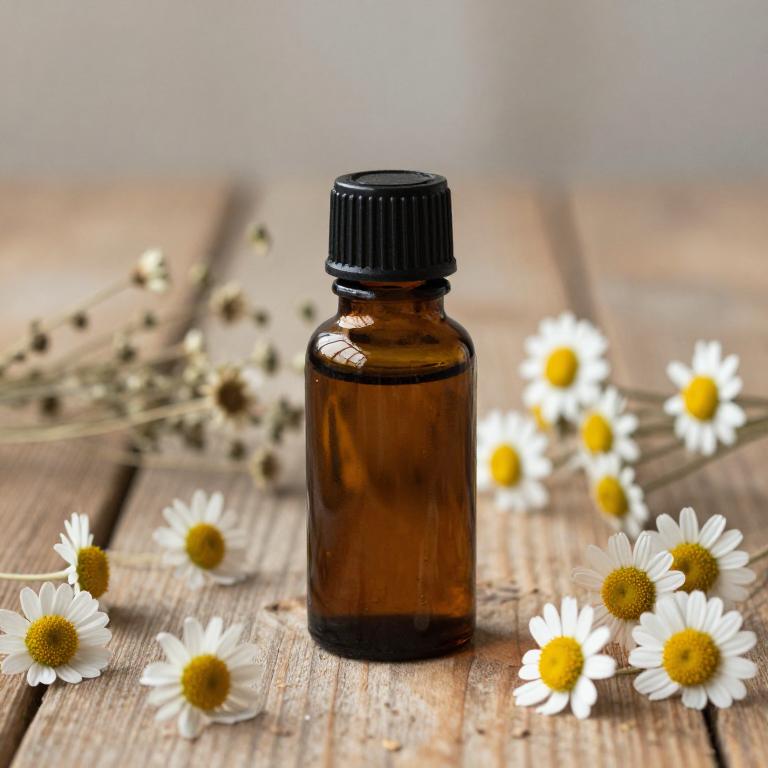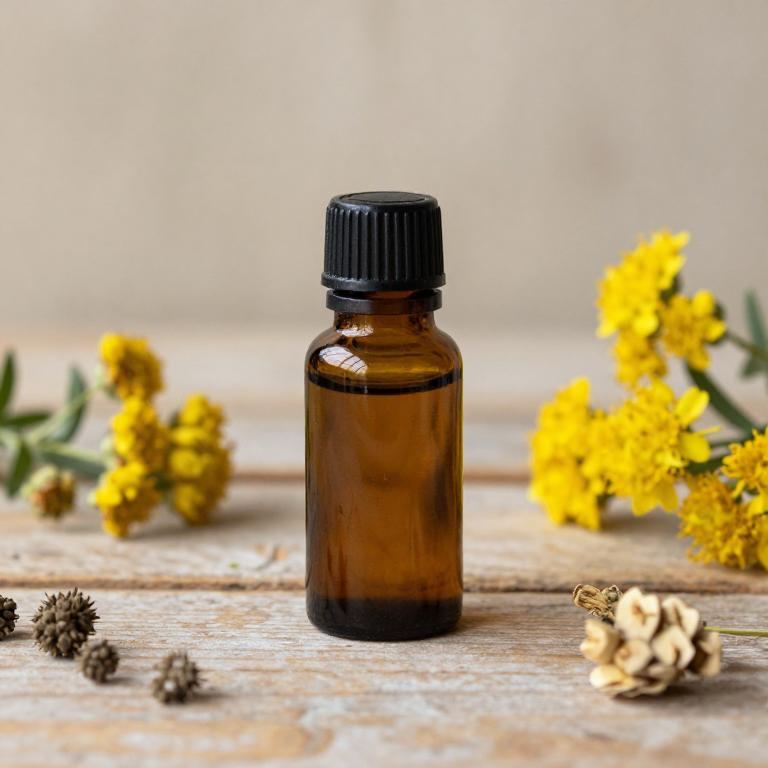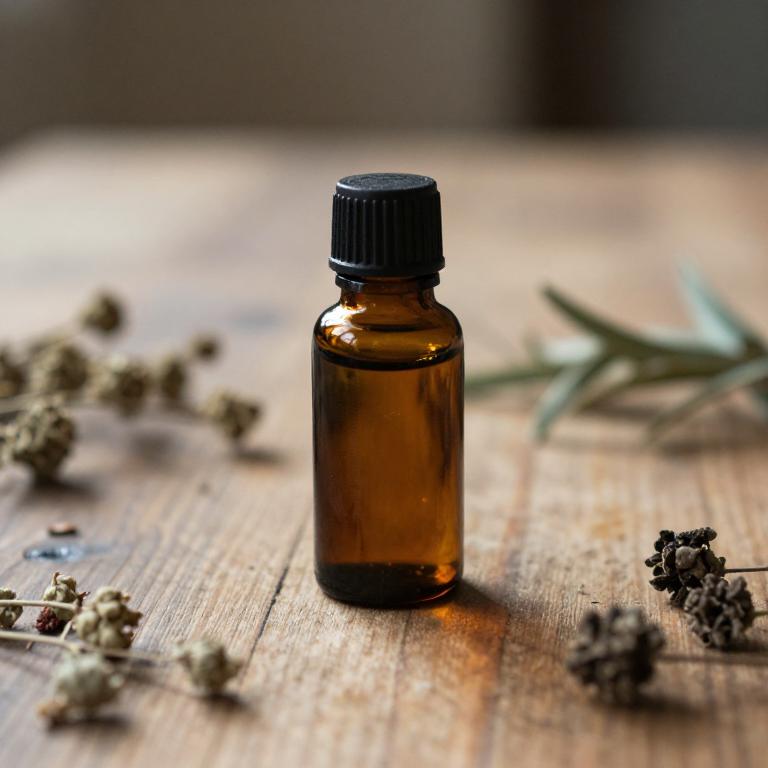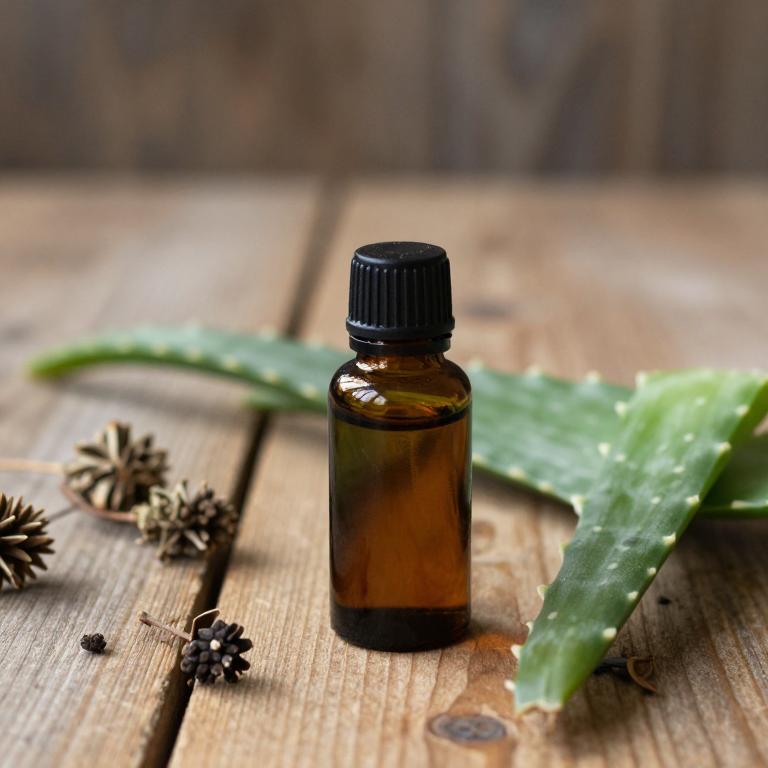10 Best Herbal Essential Oils For Acne

Herbal essential oils have gained popularity as natural remedies for acne due to their antibacterial, anti-inflammatory, and skin-regulating properties.
Oils such as tea tree, lavender, and chamomile are commonly used because they can help reduce bacteria on the skin and soothe inflamed breakouts. These oils are often diluted with a carrier oil before application to prevent skin irritation and ensure safe usage. When used consistently, they may help improve skin texture and reduce the frequency of acne outbreaks.
However, it's important to consult a dermatologist before incorporating essential oils into a skincare routine, especially for severe or persistent acne.
Table of Contents
- 1. Melaleuca (Melaleuca alternifolia)
- 2. Salvia (Salvia officinalis)
- 3. German chamomile (Chamomilla recutita)
- 4. Ginger (Zingiber officinale)
- 5. St. john's wort (Hypericum perforatum)
- 6. Turmeric (Curcuma longa)
- 7. Rosemary (Rosmarinus officinalis)
- 8. English lavender (Lavandula angustifolia)
- 9. Lemon grass (Cymbopogon citratus)
- 10. Aloe vera (Aloe barbadensis)
1. Melaleuca (Melaleuca alternifolia)

Melaleuca alternifolia, commonly known as tea tree oil, is a popular herbal essential oil derived from the leaves of the Melaleuca alternifolia plant, native to Australia.
It is well-known for its potent antimicrobial and anti-inflammatory properties, making it a favored natural remedy for acne treatment. Tea tree oil can help reduce the presence of acne-causing bacteria, such as Propionibacterium acnes, on the skin. When diluted properly with a carrier oil, it can be safely applied topically to reduce redness, swelling, and the frequency of breakouts.
However, it is important to perform a patch test and consult with a healthcare professional before using it, especially for those with sensitive skin or existing skin conditions.
2. Salvia (Salvia officinalis)

Salvia officinalis, commonly known as sage, contains essential oils that have shown potential benefits for acne-prone skin due to their antimicrobial and anti-inflammatory properties.
The primary compounds in sage essential oil, such as thujone and camphor, help to reduce the growth of Propionibacterium acnes, a bacteria commonly associated with acne. These essential oils can also help regulate sebum production, preventing excess oil that may clog pores and lead to breakouts. When diluted properly, sage essential oil can be safely applied topically to the skin as part of a natural skincare routine.
However, it is important to consult a healthcare professional before using essential oils, especially for those with sensitive skin or existing skin conditions.
3. German chamomile (Chamomilla recutita)

Chamomilla recutita, commonly known as German chamomile, is a popular herb used in the production of essential oils that are often touted for their potential benefits in treating acne.
The essential oil derived from this plant contains compounds such as chamazulene and bisabolol, which possess anti-inflammatory, antimicrobial, and soothing properties. These properties make chamomile essential oil a promising natural remedy for reducing redness, swelling, and bacterial growth associated with acne. When used topically, it can help calm irritated skin and may prevent future breakouts by balancing sebum production.
However, it is important to dilute the essential oil properly before application to avoid skin irritation, and consulting a dermatologist is recommended for severe or persistent acne cases.
4. Ginger (Zingiber officinale)

Zingiber officinale, commonly known as ginger, contains essential oils that have been traditionally used for their anti-inflammatory and antimicrobial properties.
These essential oils, derived from the rhizome of the plant, may help reduce acne by targeting bacteria such as Propionibacterium acnes, which contribute to breakouts. The active compounds in ginger essential oil, including gingerol and shogaol, possess antioxidant and anti-inflammatory effects that can soothe irritated skin and promote healing. However, due to its potency, it should be diluted with a carrier oil before topical application to avoid skin irritation.
While some studies suggest potential benefits, more research is needed to fully understand its efficacy and safety for acne treatment.
5. St. john's wort (Hypericum perforatum)

Hypericum perforatum, commonly known as St. John's Wort, is a flowering plant that has been traditionally used for its medicinal properties, including its potential benefits for skin health.
While primarily recognized for its antidepressant effects, the essential oils derived from Hypericum perforatum may also offer therapeutic applications for acne-prone skin. These oils contain bioactive compounds such as hypericin and flavonoids, which have demonstrated antimicrobial and anti-inflammatory properties that can help reduce acne-causing bacteria and soothe inflamed skin. However, it is important to note that the use of Hypericum perforatum essential oils for acne should be approached with caution, as they may interact with certain medications or cause skin irritation if not properly diluted.
As with any herbal treatment, consulting a healthcare professional before incorporating Hypericum perforatum essential oils into an acne care regimen is recommended.
6. Turmeric (Curcuma longa)

Curcuma longa, commonly known as turmeric, contains essential oils that have been studied for their potential benefits in treating acne.
These oils possess potent anti-inflammatory and antimicrobial properties, which can help reduce redness, swelling, and bacterial growth associated with acne lesions. The active compounds in turmeric essential oils, such as curcuminoids, may inhibit the production of sebum, thereby preventing clogged pores and breakouts. Additionally, these oils may support skin healing and reduce the appearance of scars caused by acne.
While further research is needed, turmeric essential oils show promise as a natural and effective complementary therapy for managing acne.
7. Rosemary (Rosmarinus officinalis)

Rosmarinus officinalis, commonly known as rosemary, is a popular herb whose essential oil has been widely used for its various therapeutic properties, including its potential benefits for acne treatment.
The essential oil of rosemary contains compounds like camphor, cineole, and borneol, which possess antimicrobial and anti-inflammatory properties that can help reduce acne-causing bacteria and soothe inflamed skin. When applied topically, rosemary essential oil may help regulate sebum production, preventing excessive oiliness that can lead to clogged pores and breakouts. However, it is important to dilute the essential oil with a carrier oil before use to avoid skin irritation.
Overall, rosemary essential oil can be a valuable natural remedy for managing acne when used appropriately as part of a holistic skincare routine.
8. English lavender (Lavandula angustifolia)

Lavandula angustifolia, commonly known as English lavender, is widely used in aromatherapy and natural skincare for its calming and therapeutic properties.
Its essential oil contains compounds like linalool and linalyl acetate, which have antimicrobial and anti-inflammatory effects that can help reduce acne-causing bacteria and soothe inflamed skin. When applied topically, lavender essential oil may help balance sebum production and promote skin healing, making it a popular choice for those with acne-prone skin. However, it should always be diluted with a carrier oil to avoid skin irritation.
Overall, lavender essential oil offers a natural and effective option for managing acne when used properly as part of a holistic skincare routine.
9. Lemon grass (Cymbopogon citratus)

Cymbopogon citratus, commonly known as lemon grass, produces a herbal essential oil that has gained attention for its potential benefits in treating acne.
This essential oil contains compounds such as citral and myrcene, which exhibit antimicrobial and anti-inflammatory properties, making it effective in combating the bacteria Propionibacterium acnes associated with acne. Its ability to reduce sebum production and regulate skin pH further supports its role in preventing and managing acne. When used properly, lemon grass essential oil can be a natural and safe alternative to conventional acne treatments.
However, it should always be diluted with a carrier oil to avoid skin irritation and ensure safe application.
10. Aloe vera (Aloe barbadensis)

Aloe barbadensis, commonly known as aloe vera, is a popular herbal plant often used in the formulation of essential oils for acne treatment.
These oils are derived from the gel of the aloe leaf and are known for their soothing, anti-inflammatory, and antimicrobial properties. Aloe essential oils can help reduce redness, swelling, and bacterial growth associated with acne by calming the skin and preventing further irritation. When used in skincare routines, they may support clearer skin by promoting healing and balancing the skin's natural oils.
However, it is important to dilute aloe essential oils properly before applying them to the skin to avoid irritation or allergic reactions.